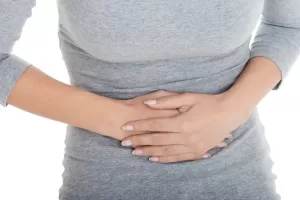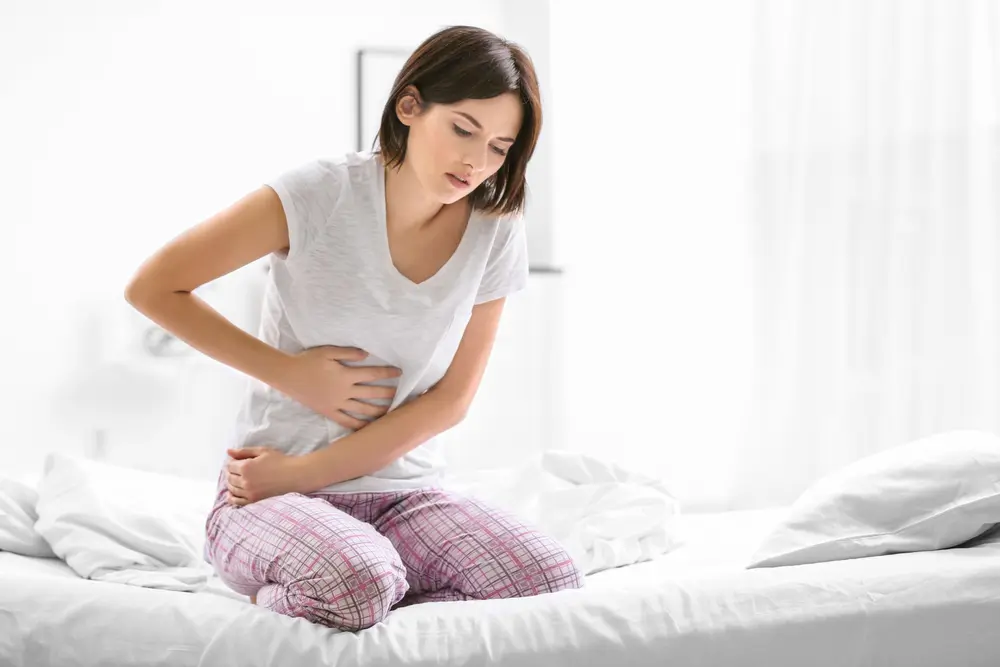Causes of tummy pain in women
Medically Reviewed by Dr Richard Bennett
Last updated on 10.06.2024
We all get abdominal aches and pains now and then- most of the time it’s nothing much to worry about and gets better by itself. However, certain causes of tummy pain can indicate a serious underlying problem and shouldn’t be ignored:
Ectopic Pregnancy
- An ectopic pregnancy is when a fertilised egg implants outside the uterus- in a fallopian tube, ovary or elsewhere in the abdomen.
- As the pregnancy grows, it can cause serious complications including internal bleeding- which, if not diagnosed quickly, can lead to death.
- The pain tends to be sharp and located low in the tummy, often to the left or the right side.
- There may be abnormal vaginal bleeding, but usually not.
- A woman may be a few days late for a period, but not necessarily.
- Any woman who is sexually active and develops lower abdominal pain that is not settling should see a doctor as soon as possible- particularly if her period is late, the pain is sharp or getting worse, or if she is feeling weak and unwell.
- Quick diagnosis of ectopic pregnancy is extremely important. Treatment can involve medication or surgery.
Pelvic Inflammatory Disease (PID)
- PID is caused by sexually transmitted infections such as Chlamydia and Gonorrhoea, which are caught by having sex without a condom.
- Symptoms include pelvic pain which can be dull or sharp.
- In some women it comes on suddenly- fevers, chills and general unwellness.
- There may be abnormal or smelly vaginal discharge, unexpected vaginal bleeding and pain during sexual intercourse.
- In other women, it may present less suddenly- there might just be pelvic aches and pains for weeks or months, with or without the other symptoms mentioned above.
- It’s very important to diagnose PID as soon as possible, as it can lead to complications such as infertility due to scarring in the pelvis and fallopian tubes, and a higher risk of ectopic pregnancy.
- Your GP can perform an examination, and may perform vaginal swabs and a urine test.
- Antibiotics can clear the infection, but cannot get rid of scarring that has already happened.
Pyelonephritis
- Women are generally more prone to urine infections as they have a shorter urethra, so it’s easier for bacteria to travel up to the bladder.
- In pyelonephritis, bacteria spread from the bladder to the kidneys. This leads to pain in the middle part of the back- on one or both sides, around the lower part of the ribcage. It can be quite severe.
- There may be fevers, chills, sweats, nausea or vomiting.
- There may also be urinary symptoms such as a burning sensation when passing urine, passing urine more frequently than usual, and sometimes there may be blood in the urine.
- Treatment involves antibiotics, but if a person is very unwell, hospital admission may be needed for pain relief and antibiotics through a drip.
- Again, pyelonephritis can be very serious, as infection can spread to the bloodstream (sepsis)- so early diagnosis and treatment is essential.
Gallstones
- Women are more likely than men to get gallstones. These stones form in the gallbladder, which is located in the upper right part of the tummy, near the liver.
- If stones get stuck in the opening of the gallbladder, it can cause spasms of severe pain- also known as “biliary colic”. This pain may spread around the side, into the back. In some people it seems to be triggered by eating fatty foods.
- In other cases, the presence of stones can lead to infection in the gallbladder, known as “acute cholecystitis”. This tends to cause a more continuous type of pain in the upper right part of the abdomen, and may be accompanied by fevers, chills and general unwellness.
- These conditions often require hospital admission, for pain relief, and in the case of cholecystitis, antibiotics. Ultimately, surgery to remove the gallbladder may be required.
Endometriosis
- Endometriosis is a condition that affects about 1 in 10 women, most commonly between the ages of 25 and 40.
- If a woman has endometriosis, the kind of tissue that lines the uterus (womb) starts to grow outside the uterus, in places where it shouldn’t normally be- most commonly on and around the ovaries, the fallopian tubes, and occasionally the bowel or other locations.
- The trouble is, this tissue tends to bleed each month when a woman has her period, leading to inflammation, pain and scarring. The most common symptoms are pelvic pain and painful periods- and these tend to worsen over time.
- In addition, women may experience pain during sex, pain when passing urine or bowel motions (often worse during a period), constipation, diarrhoea, bloating and fatigue.
- Cysts called endometriomas may form in the ovaries.
- Infertility may also occur, thought to be caused by scarring in the fallopian tubes, though there may be other factors.
Ovarian Cysts
- Sometimes women can develop a cyst on their ovary.
- There are several different types of ovarian cysts, and some women can be quite prone them ( e.g if they have PCOS or endometriosis).
- Whilst ovarian cysts may be have no symptoms, pain can occur if they twist, rupture or get big enough to place pressure on other organs.
- The pain tends to be low down in the pelvis on the affected side.
- Symptoms can be quite similar to appendicitis or an ectopic pregnancy, so immediate medical attention should be sought.
Of course, there are many many other causes of tummy pain- we’ve just gone through some important types that are particularly relevant to women. If you have concerns about abdominal pain, be sure to speak to a doctor as soon as possible.
Further resources
Getting a Mental Health Care Plan in Australia: Your Guide
Getting a Mental Health Care Plan in Australia: Your Guide Mental health matters—and if you’re feeling overwhelmed, anxious, or down, a mental health care plan can help. But what is it, and how do [...]
UTI Symptoms and Treatment: What You Need to Know
UTI Symptoms and Treatment: What You Need to Know Urinary Tract Infections (UTIs) are common, uncomfortable, and often disruptive. But what exactly are the signs to watch for, and how can you get relief [...]
Free Mental Health Care Plan Online | Bulk-Billed by Qoctor
Free Mental Health Care Plan Online | Bulk-Billed by Qoctor Discover how to get a free, bulk-billed Mental Health Care Plan (MHCP) in Australia through Qoctor's telehealth service. Accessing [...]






